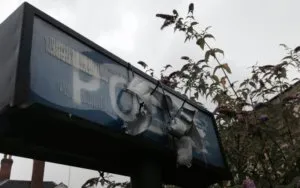Angry campaigners have attacked the government’s new hate crime action plan for its “totally disrespectful” failure to address problems around disability-related hostility.
The four-year action plan was published this week by the new home secretary, Amber Rudd, and aims to address prevention; responding to hate crime; increasing reporting; improving support for victims; and building understanding of the nature and scale of the problem.
But the 40-page document focuses strongly on race and faith-based hate, and provides few if any fresh ideas for addressing disability hate crime.
This is despite figures from the Crime Survey for England and Wales, which found that disability hate crime makes up one-third of all hate crime, even though under-reporting means it only represented five per cent of hate crimes recorded by police in 2014-15.
On prevention, there is no mention of disability, and in the section on responding to hate crime in local communities, the action plan’s only disability-focused policy appears to be to “look at current best practice examples in tackling disability hate crime and work with partner organisations and the police to promote safety for disabled people”.
On reporting, the government will “continue to work with community groups to raise awareness of hate crime among disabled people”, and will increase the number of third-party reporting centres.
It says police will develop resources to raise awareness of disability hate crime among carers and families of disabled people, and will assess projects being piloted by police forces in which “crimes against disabled people are automatically considered to be hate crime, unless evidence is found to the contrary”.
The plan says the Crown Prosecution Service will publish a policy statement on crimes against disabled people, while the government will consider “recommendations” to bring in new aggravated offences based on disability-related hostility, as already exist with hostility based on race and religion.
The government also plans to work with academics and community groups to “better understand the nature of disability hate crime, including factors such as social isolation, residential status, poverty, education and employment”.
But Stephen Brookes (pictured), a coordinator of the Disability Hate Crime Network, said: “The Home Office action plan said absolutely nothing in terms of disability hate crime.
“Whilst we know that we live in very unhappy times in relation to extreme race and faith hate crime, nevertheless to reduce disability hate crime to a few lines was nothing less than totally disrespectful to a large sector and community who face day-to-day hostility.”
He said it was vital for the network – and other disabled campaigners – to submit evidence to a hate crime inquiry being carried out by the home affairs select committee.
He said the network would provide evidence to the inquiry on current legislation, law enforcement policies and the “all too frequent criminal justice system failures and barriers that prevent individuals from reporting hate crime, and the often irresponsible role of social media companies and other online sources of hate crime”.
Brookes said it was crucial for disabled people to “unite in strongly challenging attitudes that underpin hate crime, and importantly press the whole criminal justice system and particularly the judiciary in getting their respective acts together and stop the current postcode lottery of good and bad treatment of disability hate crime”.
Andrew Lee, director of policy and campaigns for People First (Self Advocacy), said it was “absolutely unforgivable that disability hate crime has yet again been forgotten in such a big way”.
He said the biggest hurdle for disability hate crime survivors was whether they would be believed, and that there was a need for an “earthquake” to persuade politicians to understand the importance of the “devastating impacts a disability hate crime can have on the rest of your life”.
Another disabled activist, David Gillon, described the disability elements of the action plan as “old, tired and tacked on as an afterthought”.
Anne Novis, another coordinator of the Disability Hate Crime Network, said there were no significant announcements on disability hate crime in the action plan, which also suggested a “knee jerk reaction” rather than a realisation that when hostility towards any marginalised group increases “it also impacts on disabled people as part of all communities”.
She said disabled people would remain “at the bottom of the list of the priorities on hate crime” until the government’s actions were coordinated to ensure an equal approach for all groups.
Novis said she believed hate crime towards disabled people had increased in the wake of the referendum vote to leave the European Union, just as race hate crime had risen.
Disabled activist Charlie Foulkes, a supporter of the network, warned that all marginalised groups would be seeing an increase in hate crime in the wake of the Brexit vote.
He said: “I was assaulted myself in the week of the referendum.
“The government and media has been whipping up hatred towards immigrants and ‘scroungers’ for years now and the same people who have lapped it up are the ones who are perpetrating the crimes now they feel vindicated by Brexit.
“I know not all Leave voters are racists, but all racists are Leave voters. Unfortunately the same people hate disabled and gay people too and it is like a bottle has been uncorked.”

 Ministers are considering further extension to disability hate crime laws, after pledge on ‘aggravated’ offences
Ministers are considering further extension to disability hate crime laws, after pledge on ‘aggravated’ offences Abuse of disabled supporters at live sports events is growing problem, survey finds
Abuse of disabled supporters at live sports events is growing problem, survey finds Call for hate crime law reform, as broadcaster says young people too sick to work are ‘parasites’
Call for hate crime law reform, as broadcaster says young people too sick to work are ‘parasites’